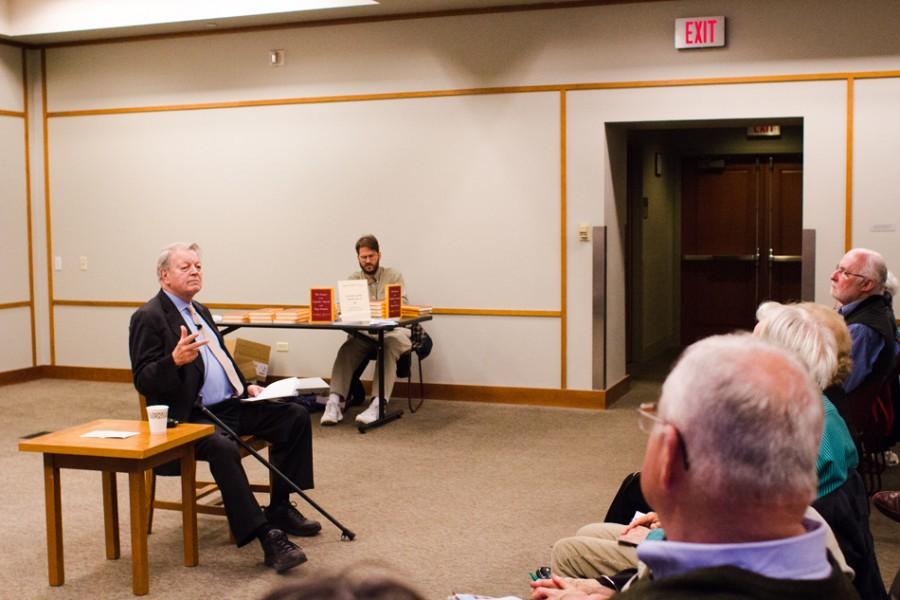Pulitzer Prize winner discusses Catholic Church social changes
Connie Wang/The Daily Northwestern
Author Garry Wills discusses the disparity between the Catholic Church’s conservatism and its constituents’ increasingly liberal beliefs. He spoke about his new book, which covers this topic, as part of the Evanston Literary Festival on Wednesday night.
May 13, 2015
A Pulitzer Prize-winning author discussed Wednesday changes to the Catholic Church surrounding society’s shifting social beliefs at the Evanston Public Library.
Garry Wills, a writer who primarily explores topics of Roman Catholicism, spoke to about 100 community members and Northwestern students at the event as part of the inaugural Evanston Literary Festival.
Although Wills predominately writes about religion, he received the 1993 Pulitzer Prize for General Nonfiction for his book, “Lincoln at Gettysburg: The Words That Remade America.” A Roman Catholic, Wills discussed his dissent from the conservative Catholic Right, the rise of liberal beliefs in the Catholic community, and his recent book, “The Future of the Catholic Church With Pope Francis.”
“There are certain teachings which are totally ignored by Catholics,” Wills said. “The abortion rate among Catholics is the same as everybody else, the use of contraceptives … is rising in every poll. In this case, the church, the people of God have just moved on.”
The appointment of Pope Francis, who is widely considered a progressive pope, has angered conservatives, yet disappointed liberals who wish to see even greater change to the Vatican’s political climate, Wills said. He said that although this pope has generally strayed from more conservative Catholics on issues such as the condemnation of LGBT lifestyles, liberal Catholics have been disappointed with Francis’ track record regarding abortion and contraceptive use.
“On things like sexual morality, the preceding popes made it a litmus test if you wanted to be a bishop,” Wills said. “Everyone had to pass that test including Pope Francis. So when this pope says ‘I’m a sinner,’ he is, he’s part of that sinful system, and he wants to make up for it.”
This “system” also prevents Pope Francis from implementing the reforms that liberal Catholics desire, Wills said. He said it would be against liberal principles to try to implement reform without getting input from other church members. Wills gave the example of the scandal following the discovery that some Catholic priests had abused children and after Pope Francis used investigative commissions. Wills emphasized Francis’ condemnation would do little to bring about an overhaul of this part of the “Church’s culture.”
“Let’s imagine that he could, by his own decree, make up what the bishops covered up,” Wills said. “That is pretty much like saying we are going to make up as Americans over slavery … We can’t make up for slavery … The same is true of the abuse of children.”
Although Wills said the Church’s culture is deeply conservative and quiet, he added that the cultural fabric of its constituents is rapidly changing.
Lesley Williams, the head of adult services at EPL, considered Wills’ discussion of a collective consciousness among Catholics to be the main theme of his talk.
“This was very topical,” Williams said. “Even if you’re not Catholic, even if you’re not Christian, these things affect all of us, because people were saying ‘what about climate change, what about sexual abuse,’ and these issues affect everyone.”
McCormick senior Jonathan Li said he was most interested in how the overall theme of Wills’ lecture applied to his own Catholic identity.
“I am Catholic, and I’ve been disillusioned by the Church because of these scandals that have happened,” said Li, a former Daily staffer. “Wills was really bold in also saying, ‘I am Catholic,’ and calling out this traditional fallacy that the Church can do no wrong.”
Email: elenasucharetza2018@u.northwestern.edu
Twitter: @elenasucharetza



